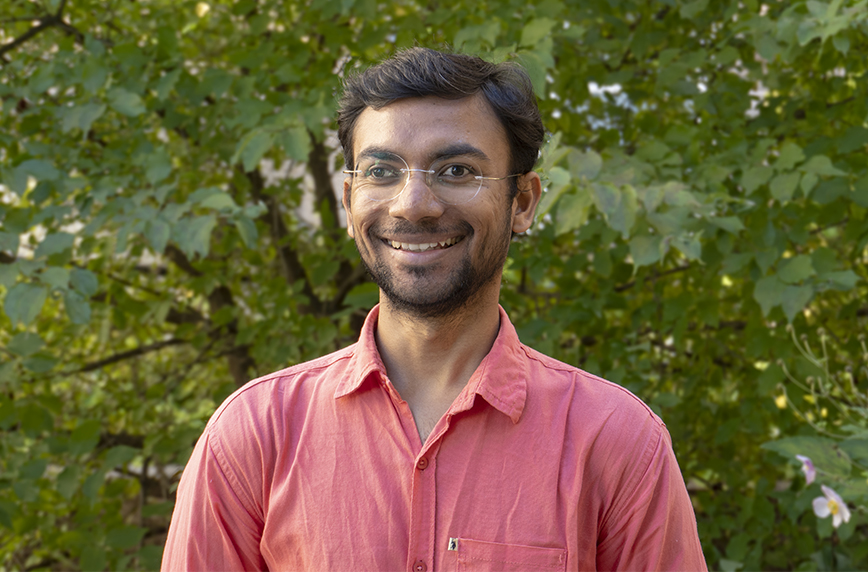Ronak
Ronak comes from Gujarat, India. He did his bachelor's degree in Electronics and Communication from Vellore Institute of Technology (VIT), Chennai, India. His hobbies mainly consist of travelling and cooking.

Why did you choose this master's programme at KTH?
“There is plenty of room at the bottom” – Richard Feynman
I first read this quote back in High school, and it was like to glimpse into the future. The beauty of how atomic species come together and create everything we can and cannot see is unfathomable. Nevertheless, I decided that I want to explore the field of Nanotechnology as much as I can, and innovation is one of the most critical tools for it. It was pretty simple after that; Innovation + Nanotechnology = KTH.
The programme at KTH looked well structured and had all the subjects I wanted to pursue in details. KTH ranks in the top in 20 Electrical Engineering and top 30 in Material Science. KTH is also located in Stockholm, the city hosting the biggest prize of the scientific community, the Noble Prize. What better motivation could there be for anyone to study at such a university and in such a country.
What are the best aspects of your programme?
Nanotechnology is the most interdisciplinary programme I have ever seen, and that is the beauty of it: a physicist, a chemist, a biologist and a couple of engineers seated at the same table and discussing the future. The programme offers two specialisation tracks, Nanomaterial and Nanoelectronics, and additional flexibility to select courses of your liking from other departments. To understand the knowledge obtained in lecture rooms better, we have the laboratories as another exciting aspect of the course. They look as cool as they look in movies and that is why the first thing taught here is chemical handling and general discipline to be followed in labs.
Have you chosen a specialisation track within the programme?
As of now, I have not finalised on my specialisation track in the programme. It is quite a conundrum since Nanomaterial and Nanoelectronics go hand in hand, and I have been to both the sides of it in my undergrad degree, which is in electronics and my undergrad thesis which was in materials.
What are some of your favourite courses so far?
All the courses are interesting since it has a little bit of every field of science in it, but solid-state physics and chemistry for nanotechnology have been my favourite courses thus far. I have studied solid-state physics before, but the course here gave me a completely different perspective to see the physical world. The chemistry for nanotechnology is an introductory course which helped me revise all my high school knowledge and how to embed it in the nanomaterial synthesis. These courses were good, but it is even more fun when you get the right professor.
How does studies at KTH differ from your previous studies?
There is no real comparison between my KTH and my undergrad university VIT, since both lie in the different corners of the world. Yes, there are similarities on few occasions, for instance, I used to have five courses per semester in my undergrad, whereas KTH has the same thing broken down in study period 1 & 2 with three courses in period 1 and two in period 2, which means the pace of studies for masters is extremely fast. In addition to that, the grading works differently at KTH. The professor has the independence to decide how her/his students will be examined and graded. Yes, the times of COVID-19 has affected the system, but it goes smoother than my previous university even now.
How is student life in Stockholm?
Stockholm is a real beauty, I had seen it in movies and tv shows quite a few times, but when I saw it for the first time, I just did not want to blink. From a student's perspective, the city is very kind, generous and welcoming. The student union at KTH – THS fills the void in a student's life with joyful colours. THS organises several types of events for everyone and at the same time helps you with your networking, which can be pretty hard for someone who is stepping out of her/his country for the first time.
How would you describe your time at KTH so far?
I had a great time, going to the international reception events and visiting historical places before my classes started. Now I enjoy spending my time at the KTH biblioteket (Library), labs and exploring the different campuses around the city. Lunch lectures and seminars are other fun ways I found where I meet other people and have brief discussions. I spend my evenings sometimes reading and sometimes playing indoor games at the school chapters. Overall, I would say I am still in the exploring mode, and I am looking forward to having an even better time at KTH.
What do you want to do after graduating?
I will be graduating in 2022, which means I have time to assess the situation, especially in current conditions carefully. Ideally, I would like to go for a job in the R&D sector and contribute to society with futuristic technology.
What would you like to say to students thinking of choosing KTH for master's studies?
I decided to join KTH in June 2020. I found KTH to be sky high above my expectations, be it academics, student life, city, new friends or culture. The fact that you are reading this answer means you are at the right place at the right time in considering to apply for your master's. I know the process might be confusing, the ongoing pandemic, and the uncertainty around almost all your decision. That is why, as your student ambassador, I am here to help you out with any queries you have pertaining to academics, studies during the pandemic or any other general queries.
